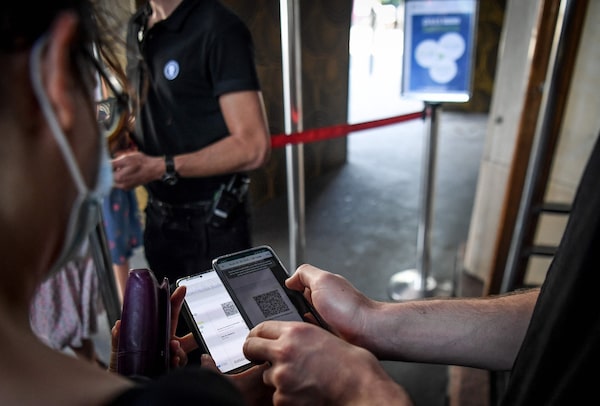
Canadians wanting to eat at a restaurant, go to a bar or gym, or attend a festival in Quebec will have to present a vaccine passport starting Sept. 1. Many restaurants across Canada are taking steps to check vaccination status of their customers.ALAIN JOCARD/AFP/Getty Images
Visiting a restaurant in most cities west of Toronto will offer up an air of normality, with many health restrictions now lifted. But as a fourth wave grows, some restaurants are worried a return to normal is too soon.
Bobby Mottola is the president of Academy Hospitality, a restaurant group in Winnipeg that runs a variety of well-known eateries in the city including The Merchant Kitchen, Gusto North and the longstanding Pizzeria Gusto. Manitoba’s provincial government dissolved indoor dining restrictions such as dining with same household only and requiring guests to wear masks when walking to and from tables, but Mr. Mottola and his group have decided to keep some requirements in place.
His restaurants politely request that all guests, vaccinated or not, put on a mask when moving throughout the space they are dining in. As well, all members of a party must show proof of vaccination at the door, if they are from different households, to be able to sit together.
“We don’t make these decisions in a silo,” Mr. Mottola says. “We have counsel, you know – doctors, friends, clients or family members – as you do when you make these big decisions. Arguably, this was one of the easiest for us to make compared [to other decisions] in the previous months.”
He said a large part of the decision was the safety of the staff.
“It certainly carries a lot of weight. ... They work really, really hard and our job is to continue to take care of them as best we can,” he says.
A decision like this clearly comes with backlash, especially via social media, but Mr. Mottola said most of the response to Academy Hospitality’s decision to uphold certain protocols has been positive.
“The vocal minority has every right to say the things that they say, but I think we have a social and a moral responsibility to continue to try and keep people safe and do our part. It may not be the smartest decision for us to continue to somewhat limit our capacity, limit the people that can come through our door, but we do feel that it is by far the best decision in the long run,” he says.
This type of in-house pandemic-related protocol isn’t very common in Canada, though Edmonton’s Fleisch Delikatessen is another example of a restaurant that has opted for similar self enforcement.
Owner Katy Ingraham has been vocal since the onset of the pandemic about the safety of foodservice workers and how the provincial government has chosen to deal with the waves of cases over the past 18 months.
Fleisch requires proof of vaccination for customers to eat and drink inside. Otherwise, it is patio service only.
“I don’t want to return to ‘normal’ hospitality, which is, you know, a lot of very abusive and exploitative environments for workers,” she says. “So, as long as I know that we’ve done absolutely everything possible that we can do to make sure that our staff are safe, then I feel that we can start to do some of the things that we do want to do like having indoor dining [for all] and have people not wear masks indoors.”
In Toronto, Chantecler is a popular dining destination in the city currently only open for patio service. Owner Jacob Wharton-Shukster says the restaurant has been exploring how to reopen fully with reduced risk to staff.
“We publicly floated the idea [of requesting proof of vaccination] for the seats in close proximity to the bartender. Our better understanding of coronavirus spread via aerosols has led us to believe that the staff would be placed needlessly at risk; that said, bar service has been an important part of our business since Day 1. We thought a vaccine requirement could mitigate that risk,” Mr. Wharton-Shukster says.
Few restaurants I contacted in Western Canada wanted to go on the record about plans to take extra precautions, but many applauded those efforts and said they wished they similarly could do them. But restaurant owners in cities such as Saskatoon, Calgary and Kelowna worried about backlash.
Quebec restaurants soon won’t have to decide: the provincial government is set to launch a vaccination-passport program on Sept. 1. This will limit unvaccinated people’s ability to access spaces such as restaurants, bars, gyms and event venues.
San Francisco will be the first city in North America to officially enforce a bylaw for proof of vaccination to access certain businesses and public spaces. The mandate kicks in Aug. 20, but it is also one of many U.S. cities that has reinstated face coverings indoors in the past month.
As well, New York City officials announced last week that they will soon be activating a bylaw that will require individuals to show proof of COVID-19 vaccination before being allowed to dine indoors, see a theatrical production, go to a gym and more.
Watching culinary meccas like these begin to clamp down again in the name of public safety makes one feel that the return to normalcy will be short lived.
“No matter where you look, we’ve seen the fallout from these types of things over the past year and a half when [restrictions relax] too early. Although it seems great for a few weeks or months – whatever the time frame has been for different provinces – it has also been quickly followed by more severe limitations than we received previously,” Mr. Mottola says.
We have a weekly Western Canada newsletter written by our B.C. and Alberta bureau chiefs, providing a comprehensive package of the news you need to know about the region and its place in the issues facing Canada. Sign up today.
 Dan Clapson
Dan Clapson